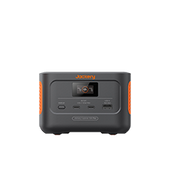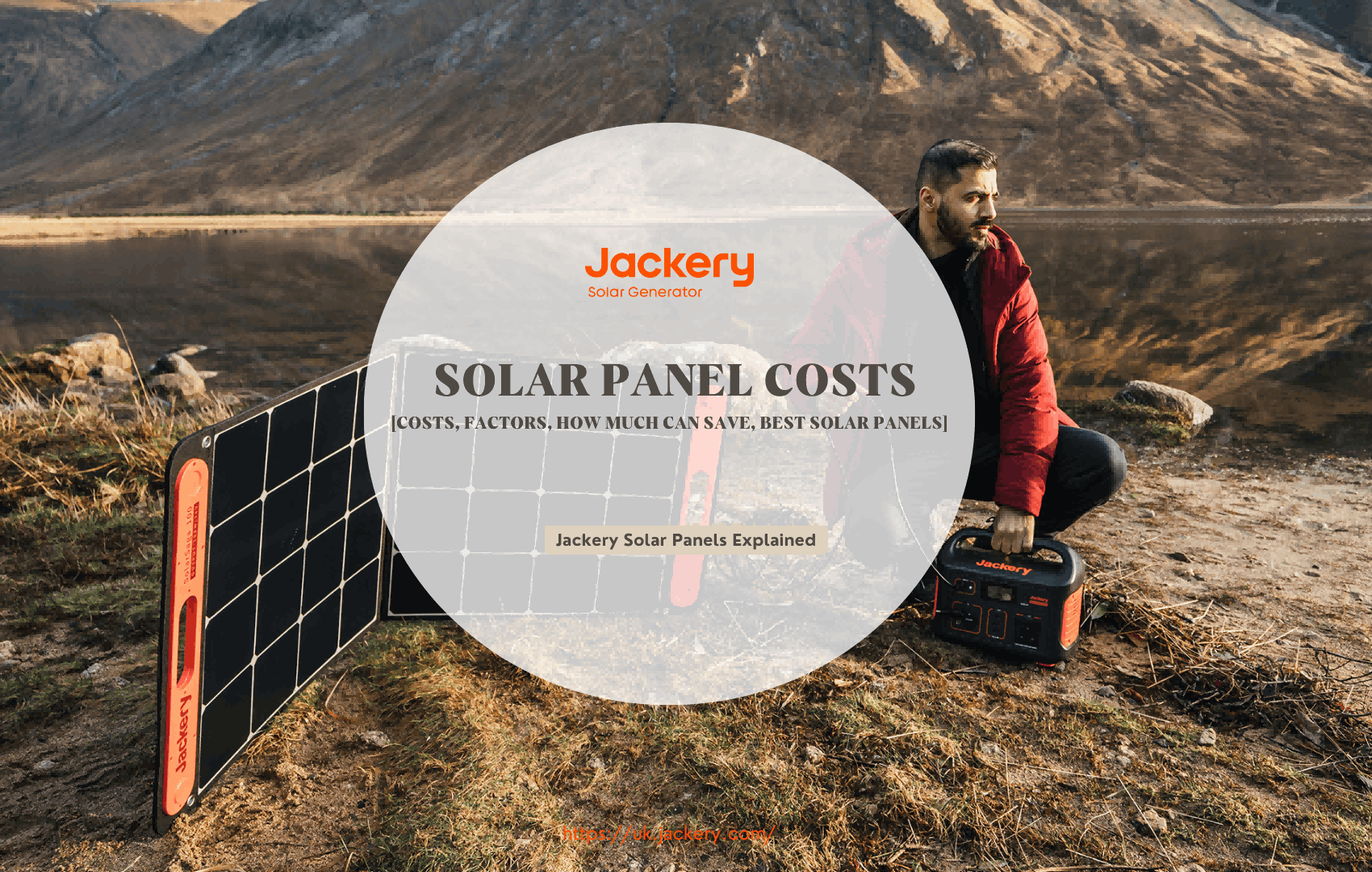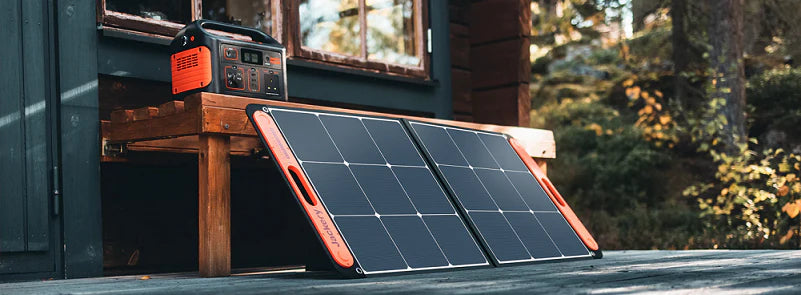Solar power is a clean energy that produces no carbon emissions, allowing you to reduce your reliance on the national grid. Solar panels are a great way to produce renewable electricity for your home.
You can invest in solar panels to take advantage of free, clean solar energy, but unfortunately, solar panels are not free. So, it's vital to have information about the cost of solar panels.
This page will explain everything about solar panel costs in the UK, such as factors that affect the cost and how much you can save. Also, we highly recommend Jackery Solar Panels, which are portable, lightweight, and powerful and combine with Jackery Portable Power Stations to use solar energy fully.
|
Key Takeaways: |
|
- In the UK, the cost of solar panels has not increased but has become cheaper. - In 2013, the average solar panel price per watt was around £2.50. Today, that figure has fallen to around £1.50 per watt. - In addition, the installation cost of a residential solar panel system has fallen by 26% from 2013 to 2022. - Many factors affect the solar panel's costs, such as the solar panel types, number of solar panels, quality, and solar market development. - We highly recommend Jackery Solar Generator 2000 Plus and 1000 Plus (combo of Jackery Solar Panels with Portable Power Stations) for outdoor and indoor uses. - The current solar panel incentives in the UK have significantly reduced the financial burden on homeowners and businesses considering installing solar facilities. |
Are Solar Panels Getting Cheaper in The UK?
Are solar panels increasing in cost in the UK? Far from rising prices, solar panels are getting cheaper in the UK.
In 2013, the average solar panel price per watt was around £2.50. Today, that figure has fallen to around £1.50 per watt. In addition, the cost of a residential solar panel system installation has fallen by 26% from 2013 to 2022.
A 4kW system that cost between £5,000 and £8,000 in 2018 cost nearly £15,000 in 2020. The average cost per kilowatt (kW) for a 0 to 4kW solar panel system fell by more than 20% between March 2023 and 2024. And the price per kW for a 4 to 10kW solar panel system fell by nearly 15%.
The dramatic price reduction of solar panels has enabled countless homeowners to embrace solar power and experience its benefits firsthand. Overall, the solar panel industry has matured, becoming more efficient and streamlined, contributing to lower costs.
Solar Panels Costs in The UK
While solar panel costs have fallen significantly worldwide over the past decade, the UK has seen a less stable growth trend.
Despite the fluctuations, UK government data shows solar panel prices have generally increased from 2013 to 2023. However, in 2024, solar panel costs fell in the UK. The average solar panel cost in the UK is typically between £2,500 and £10,500.
It is a graph of the current cost of solar panels for different property sizes in the UK. (The data in the graph is a rough estimate and is for reference only.)

(Data Source: independent.co.uk)
Cost of Different Types of Solar Panels
The installer's quote will usually cover the total number of panels required rather than the cost of a single panel. The price of a single panel depends on the panel brand, type, power output, and efficiency, with the best solar panels costing £70 each. Solar panels typically account for around 33% of the total cost of a project.
Monocrystalline solar panels have 15% to 20% efficiencies. They have a longer lifespan than other solar panels but are also more expensive. Generally speaking, monocrystalline solar panels cost between £1 and £1.50 per watt.
Polycrystalline solar panels are slightly less efficient, generally between 13% and 16%. While they are usually cheaper than monocrystalline solar panels, more may be required. Generally speaking, polycrystalline solar panels cost between £0.90 and £1.00 per watt.
Unlike other solar panels, thin-film solar panels are lightweight and flexible. They are the cheapest type of solar panel per watt, but as they have the lowest efficiency rating, they may be more cost-effective. Generally speaking, monocrystalline solar panels cost between £0.40 and £0.80 per watt.
Cost of Other Ancillary Equipment
The total cost of a solar panel system is related to the price of the inverter, battery and installation, and the cost of the solar panels.
Inverter: The solar inverter usually accounts for 10% to 20% of the total installation cost. The price of the inverter is between £900 and £1,500, depending on its type and the size of the system. In addition, the life of the inverter is usually about ten years.
Batteries: Solar storage batteries are an optional extra. However, solar storage batteries can store excess energy generated by the solar system and then use it at night or sell it back to the grid. It will allow you to save excess electricity, which will likely break even earlier. Solar batteries cost between £1,000 and £4,000, depending on your desired size and type.
Installation Costs: Installation costs account for around 10-20% of the total system cost. Variables that affect installation costs include:
- Challenging roof layouts.
- Unavoidable structural upgrades to support the panels.
- Removal and replacement of roofing materials.
Factors Affect Solar Panels Costs in The UK
Solar panels are a great way to produce renewable electricity for your home, but what factors determine their final price? Several factors affect the total cost of solar panels in the UK.

- Types of Solar Panels
Different types of solar panels have different costs. Monocrystalline solar panels use the latest technology and are highly efficient but cost more. They cost between £1 and £1.50 per watt. Jackery Solar Panels adopt monocrystalline solar technology to ensure consistent power flow and absorb more sunlight for converting energy.
Polycrystalline solar panels cost around £1 per watt. While they are less efficient than monocrystalline panels, they still achieve sound power output. Thin film solar panels have an efficiency between 7% and 18%, the lowest of all types. It costs £0.80 per watt.
- Number of Solar Panels
The more solar panels you have, the more materials you have and the higher the cost. You can limit the number of solar panels you need by choosing high-efficiency solar panels (although they may be more expensive).
Number of Solar Panels = Daily Household Energy Use (kWh) ÷ Solar Panel Output (W) x 4.19h (Average UK Sunshine Hours) x 0.75
You can calculate your daily energy use by dividing the amount on your electricity bill by the number of days covered. Suppose your household's daily energy use is 3kWh, and the solar panel output is 350W.
1kWh / 350W * 4.19h * 0.75 = 8.98
Substituting the relevant data into the formula, we can get the number of solar panels to be 9.
Quality of Solar Panels
The quality of solar panels has a vital impact on their cost. High-quality solar panels with premium materials and advanced technology are more efficient, last longer, and have better warranties. So, such premium solar panels have a higher upfront cost because they can improve energy production and durability, resulting in more significant long-term savings and reliability.
Development of the Solar Panel Market
Extensive manufacturing facilities can produce solar panels more efficiently, reducing material and labour costs. Many manufacturers and installers compete for market share, and the increased competition has decreased solar panel prices.
How Much Can You Save with Solar Panels in The UK
Generally speaking, the amount you can save depends on solar panels, current energy prices and the Smart Export Guarantee (SEG) rate.
Solar panels are worth it. They can help you save between £400 and £915 per year on electricity bills. A typical three-bedroom house could save up to £871 to £1,100 per year.
Solar panels will assist you save a lot on electricity bills while meeting your home's electricity needs. Plus, solar panels can reduce your carbon footprint because they generate electricity from the sun.
After investing in solar panels, you can earn your money back quickly (around 9 to 13 years). The ROI for solar installations ranges from £4,500 - 5,500 to £9,000 - 10,000, as they can run for 25 years. A well-maintained set of quality solar panels can make the most of their lifespan.
Here are the savings and ROI for different solar panels:
|
Household Size |
Solar System Size |
System Costs |
Annual Savings |
Return on Investment |
|
1-2 bedrooms |
3kW |
£4,500 - £5,500 |
£400 |
£4,500 - £5,500 |
|
2-3 bedrooms |
4kW |
£5,000 - £6,000 |
£600 |
£9,000 - £10,000 |
|
4-5 bedrooms |
6kW |
£9,500 - £10,500 |
£915 |
£12,500 - £13,500 |
(Data Source: greenmatch)
The amount you save with solar panels will depend on factors such as:
- Your electricity usage
- Whether you use a lot of electricity during the day.
- The efficiency of the solar panels
- The size and number of solar panels
- Your Smart Export Guarantee (SEG) rate
Jackery Solar Generators Explained
Jackery SolarSaga Solar Panels have folding handles, facilitating convenient transport at any time and location. These solar panels have superior efficiency, converting more sunlight into helpful electricity than traditional panels. Compared to other panels, Jackery Solar Panels cost less but have higher energy conversion rates.
To fully use Jackery Solar Panels, you need to integrate solar panels with Jackery Portable Power Stations, enabling the storage of generated electricity in a lithium-ion battery, thereby maintaining the charge of all your equipment. That is why you need to have a Jackery Solar Generator.

Jackery Solar Generator is a reliable solar power solution for multiple purposes, including outdoor adventures, home backup, and professional work. Only the Jackery Solar Generator, which pairs Jackery Solar Panels with Explorer series power stations, can maximise solar energy usage rather than merely Jackery Solar Panels.
Jackery Solar Generator 1000 Plus: SolarSaga 100W + Explorer 1000 Plus
Jackery Solar Generator 1000 Plus combines SolarSaga 100W solar panels with Explorer 1000 Plus. We will introduce the two components respectively.
The Explorer 1000 Plus power station boasts an excellent 1264Wh long-lasting LiFePO4 battery and a 2000W full-power pure sine wave inverter, supplying almost all required power. Adding up to three additional battery packs will remarkably increase its capacity to 5kWh.
Adding up to three extra battery packs lets Jackery's exclusive technology boost the Explorer 1000 Plus capacity from 1.26kWh to 5kWh. Moreover, it has a maximum output of 2000W, 20% more than usual 1kWh LFP generators.
The Jackery SolarSaga 100W Solar Panel boasts a solar conversion rate of up to 25%; it is optimally designed for outdoor use and unforeseen power interruptions. The solar panel weighs about 8 lbs, is lightweight, foldable, and equipped with a convenient carry handle, enhancing its portability. The SolarSaga 100W has two kickstands that may be securely positioned on any surface.
The following are the working hours of Jackery Solar Generator 1000 Plus (1.26-5 kWh) to charge some essential appliances:
- Coffee Maker (550W): 1-7.7H
- Refrigerator (800W): 3-5.3H
- Air Conditioner (1000W): 1-4.25H
- Light (10W): 100.8-425H
- CPAP Machine (200W): 5-21.25H

Jackery Solar Generator 2000 Plus: SolarSaga 200W + Explorer 2000 Plus
The Jackery Solar Generator 2000 Plus is the combo of Explorer 2000 Plus portable power station with SolarSaga 200W solar panels. Jackery Solar Generator 2000 Plus is a breakthrough in expandable charging technology, which can support a typical household for weeks and satisfy all the power needs of outdoor activity or professional work.
Expanding capacity from 2 kWh to a fantastic 12 kWh - ideal for practically every use situation, including camping, off-grid living, emergencies, and more, a single Jackery Explorer 2000 Plus power station supports up to 5 add-on battery packs at a time. Expandable to 3000W, a 30% rated power boost above other 2 kWh solutions available on the market.
The Jackery SolarSaga 200W Solar Panel boasts a solar conversion rate of up to 25%, facilitating rapid adoption of eco-friendly energy solutions. The ETFE-laminated case prolongs its durability, and the suggested angle guarantees optimal sunlight absorption, rendering it an ideal power source.
It is portable, collapsable, and may be immediately connected to a power station for an optimal solar power system. Boasting a power output of 200W, it delivers the most rapid solar charging experience in Jackery's existing solar panel collection.
The following are the working hours of Jackery Solar Generator 2000 Plus (2-12 kWh) to charge some essential appliances:
- Coffee Maker (550W): 3-18.5H
- Refrigerator (800W): 2-12.75H
- Air Conditioner (1000W): 1.6-10.2H
- Light (10W): 163.4-1020H
- CPAP Machine (200W): 8.2-51H

Are Solar Panels Expensive To Maintain in The UK?
How much does it cost to maintain solar panels? Consider three future solar panel maintenance costs: cleaning, inverter replacement and regular maintenance and repairs.
Cleaning: The frequent rainfall will keep most of the solar panels in the UK clean, but if possible, you should clean your solar panels twice a year. Most manufacturers recommend that you wash your solar panels every six months. You can do this yourself or hire a professional company for around £40.
Inverter Replacement: The solar inverter is crucial to any solar panel system. However, it would help if you remembered that the inverter only lasts about ten years, while the solar panel has a lifespan of 25-30 years. Therefore, you will need to replace the inverter when it fails or reaches the end of its lifespan. A new inverter can cost between £900 and £1,500.
Regular Maintenance & Repairs: Maintaining your solar panels and ensuring their longevity is to have them serviced at least every five years. An experienced installer will visit your solar panel system and perform some tests on the meter and inverter. By performing occasional maintenance, you can have peace of mind and ensure that your renewable energy system is in good condition.
In addition, solar panels are solid and rarely break, but there is always a chance they can be damaged by unexpected accidents, such as falling trees, flying crickets, extreme weather, or birds chewing on the wires. So, if you find any solar panel damage, please immediately contact professionals for repair.
Solar Panels Incentives in The UK
Governments worldwide have recognised the significance of transitioning to clean energy and have implemented various incentives and policies to support the solar industry's growth.
The UK is no exception, and there are incentives to encourage more homeowners to invest in solar.
The solar panel incentives currently in place in the UK have significantly reduced the financial burden on homeowners and businesses considering installing solar facilities, stimulating demand and driving down prices.

Smart Export Guarantee (SEG) Scheme
In 2020, the government's new Smart Export Guarantee (SEG) scheme replaced the Feed-in Tariff. Furthermore, the Smart Export Guarantee (SEG) scheme acts as a government subsidy for solar panels, reducing overall costs and encouraging wider adoption.
The Smart Export Guarantee (SEG) scheme pays homeowners for excess solar electricity delivered to the grid. In addition, solar panel installations also temporarily enjoy a 0% VAT exemption, which will last until March 2027.
SEG does not pay anything for the total units produced. Furthermore, SEG tariffs vary by energy supplier and come in variable or fixed rates. Most households can save between £85 and £500 a year with the Smart Export Guarantee. However, it would help if you had a smart meter to benefit from the SEG.
Smart Export Guarantee (SEG) and UK rate table:
|
Energy Supplier |
SEG Rate (p/kWh) |
Customer Requirement |
Details |
|
Octopus Energy |
27 |
Octopus customers |
With solar battery |
|
Octopus Energy |
23.5 |
Octopus customers |
With solar battery |
|
OVO Energy |
20 |
OVO customers |
With battery |
|
Good Energy |
20 |
Good Energy customers |
With smart meter |
|
Octopus Energy |
15 |
Octopus customers |
Outgoing Fixed |
|
OVO Energy |
15 |
OVO customers |
OVO SEG Tariff |
|
Scottish Power |
15 |
Scottish Power customers |
SmartGen+ |
|
British Gas |
15 |
British Gas customers |
Export and Earn Plus |
|
Scottish Power |
12 |
None |
SmartGen |
|
Rebel Energy |
7.5 |
None |
So Export Flex |
|
Pozitive Energy |
5 |
None |
SEG Tariff |
|
Octopus Energy |
4.1 |
None |
Outgoing Go |
|
OVO Energy |
4 |
None |
OVO SEG Tariff |
|
EDF |
3 |
None |
Export Variable |
|
Utility Warehouse |
2 |
None |
UW Smart Export Guarantee - Standard |
(Data Source: renewableenergyhub)
Other Solar Panel Incentives in the UK
In addition to the Smart Export Guarantee (SEG) scheme, several solar panel grants and schemes are available in the UK.
|
UK Grant or Scheme |
How much can you save? |
Eligibility Period |
|
Energy Company Obligation 4 (ECO4), including LA Flex |
If eligible, you can receive free solar panels (excludes Northern Ireland) |
April 2022 to March 2026 |
|
Zero per cent VAT |
20 per cent VAT on solar panels and installation costs (excludes Northern Ireland) |
April 2022 to March 2027 |
|
Home Upgrade Scheme (HUG2) |
Up to £10,000, depending on your local authority |
April 2023 to March 2025 |
|
Solar Together |
Between 10 and 25 per cent off the cost of your solar panels |
Ongoing |
|
Welsh Government Warm Homes Nest Scheme |
If eligible, you can receive free solar panels |
Ongoing |
(Data Source: fmb.org.uk)
Solar Panels Costs in The UK FAQs
The following are the frequently asked questions about the solar panels costs in the UK:
- How long does it take for solar panels to pay for themselves?
The general payback period for solar panels in the UK is between 7 and 10 years. However, the payback period for solar panels can vary depending on factors such as grants and schemes, system costs, panel size and efficiency, energy consumption and electricity prices.
- Do you need to insure your solar panels?
For many people, solar panels are still expensive. In addition, you may have made some modifications to your home when installing solar panels, and this cost cannot be ignored. Generally speaking, solar panels are installed on the roof and are likely to be damaged by weather, fallen trees, and even vandalism. So, overall, it is wise to purchase insurance for solar panels.
- When is it not worthwhile to buy solar panels?
Generally speaking, if the financial costs outweigh the benefits, installing solar panels may not be worthwhile. For example, if you live in an area with high shading, the chances of taking advantage of solar energy are low, so it is not worth buying solar panels. In addition, if you do not plan to live there long-term or have plans to move soon, you may not have time to recoup the upfront costs.
- Do smart meters work with solar panels?
Smart meters work well with solar panels. You can control your electricity usage more efficiently by pairing an intelligent meter with solar panels. , you can see how much power is generated from your solar panels and how much is exported to or from the grid.
Final Thoughts
With electricity prices remaining high, solar panels are an increasingly attractive solution for reducing your electricity bills and carbon footprint. The drop in the cost of solar panels, in particular, has facilitated this switch. More than 5% of homes in the UK already enjoy the benefits of solar panels, which is increasing yearly. For homeowners considering switching to renewable energy, the cost of solar panels is crucial.






























































































